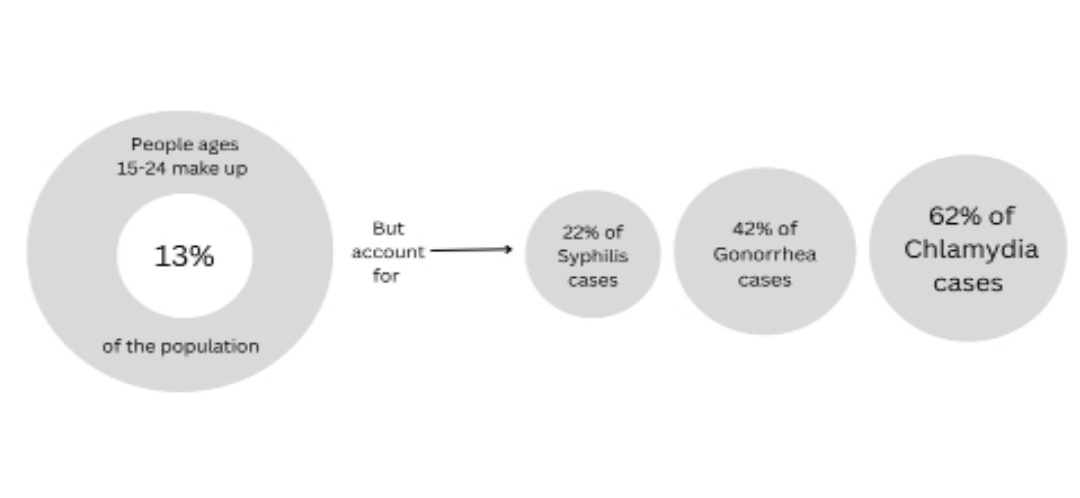Sexually transmitted diseases (STDs) affect 374 million people a year and 26 million of them are teenagers. Educating teens can be one of the most effective ways to lower their risk of contracting an STD.
In April 2022, the Centers of Disease Control (CDC) released a statement that said the rates of chlamydia, gonorrhea and syphilis across the country have been rising since 2013, with most cases occurring in adolescents and young people.
Multiple studies have demonstrated that having a sexual education (sex ed) class reduces the rates of risky sexual behaviors and STDs.
According to the American College Obstetricians and Gynecologists, “Comprehensive sexuality education programs reduce the rates of sexual activity, sexual risk behaviors (eg, number of partners and unprotected intercourse), STIs, and adolescent pregnancy.”
Exposure to sex ed correlates to the rates of STDs. Sex ed allows for adolescents to learn about their bodies and any threats they may face when making a decision.
In Florida, sex ed is limited due to laws passed by Gov. Ron Desantis. All sex ed content must be approved by the Department of Education before being taught. The Bill HB 1069 states that the sex ed curriculum has to go through the Department of Education before being taught and things such as media and books have to be approved by parents before being allowed in schools.
One way we may be able to still learn about sex ed, is having books in the library that cover topics that cannot be taught. Even though Bill 1069 requires that parents must approve any books that cover sexual orientation topics, it’s still a step towards teaching students. Basic sex ed books may go a long way when it comes to educating teens.
Although sex ed is taught in some Florida schools, including some in Broward, it’s not taught in many other school districts since sex ed is not required in Florida.
“I had a Sexual Education class in eighth grade,” sophomore Adrian Orms said. “We learned about safe sex, condoms and STDs, but I definitely think there’s more we should learn. Taking birth control and avoiding unwanted pregnancies are important topics we shouldn’t be shielded from as we get older.”
Anyone who is sexually active can get an STD; however, women are more prone to them due to their anatomy, according to the CDC. When contracting an STD there are severe and sometimes permanent health consequences including infertility and ectopic pregnancy.
According to Publichealth, individuals who abuse substances are more likely to participate in unprotected sex and have multiple sexual partners. This creates a risk considering that using condoms properly is one of the most effective ways to avoid getting an STD.
According to the Director of Harlem Health Promotion Center, Alwyn Cohall, “One likely culprit is the ‘combustible combination’ of sexually transmitted diseases and substance use, particularly the growing numbers of putting already high risk individuals at a higher risk.
There are a number of factors that could help individuals stay educated, and aid in lowering the risks of STDs in teens. One of them includes Planned Parenthood, where anyone can get information about practicing safe sex, STDs and pregnancies. There are nine locations in Florida, some locations in Pembroke Pines and Golden Glades.
Here at Krop, we have our HIP program which has been censored due to Florida legislation laws. Although the topic of sex ed cannot come up in HIP, many other important topics are covered that allow for students to make smart decisions. Our Krop Spectrum club holds an event for AIDS/HIV awarness.
“Although we can’t give students medical advice, we hand out resources like pamphlets, numbers and places to go so that students can make sure they’re staying safe,” junior and Krop Spectrum president, Konstantin Papadaki said.
This can help youth acknowledge what HIV really is and how we can support those with the illness.
The objective of STD education is to provide teens with heightened knowledge on practicing safe sex so they can make smart decisions when it comes to sexual activity. School programs are essential in reaching the teen audience which is why it’s important to provide the correct information to help young people stay healthy.






























